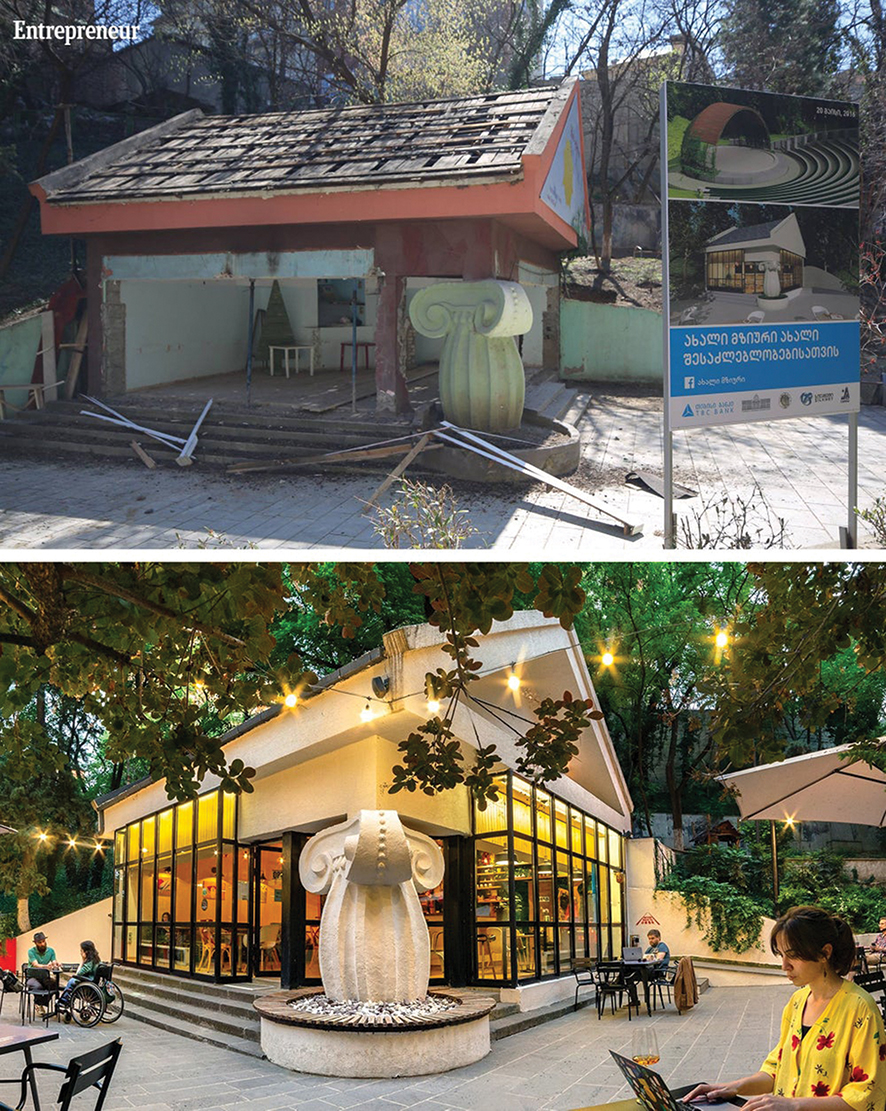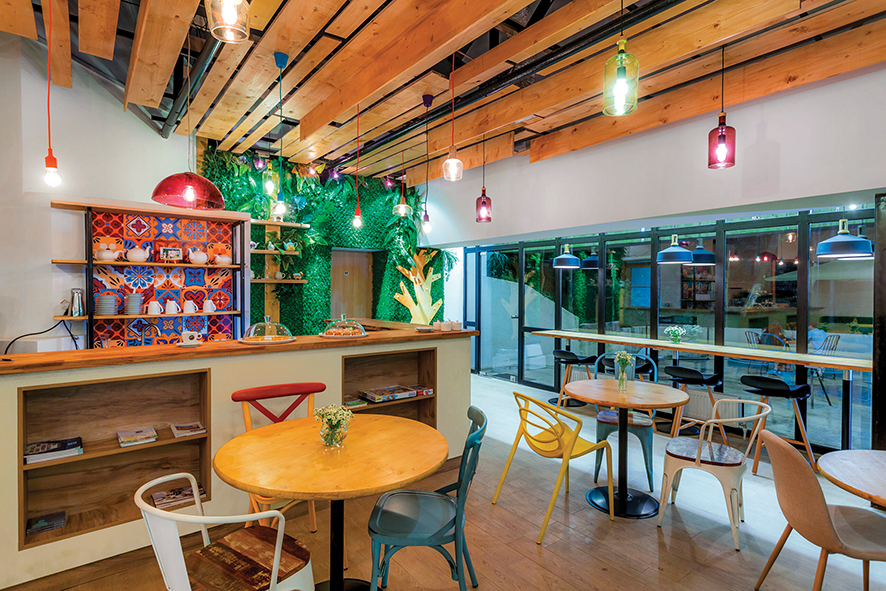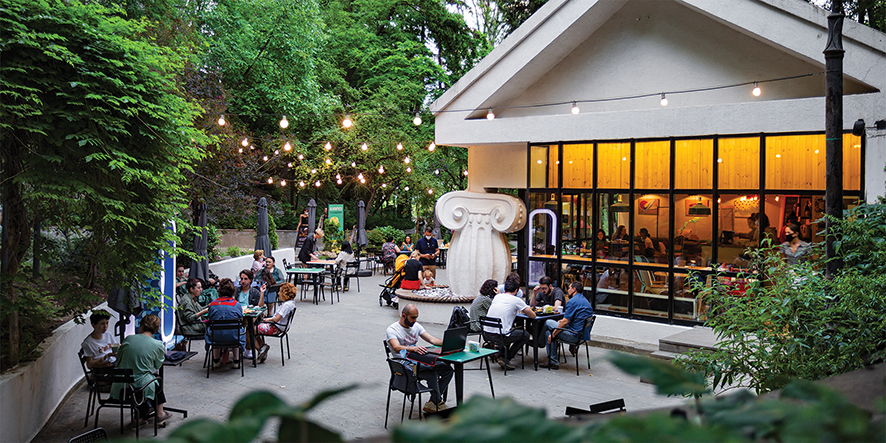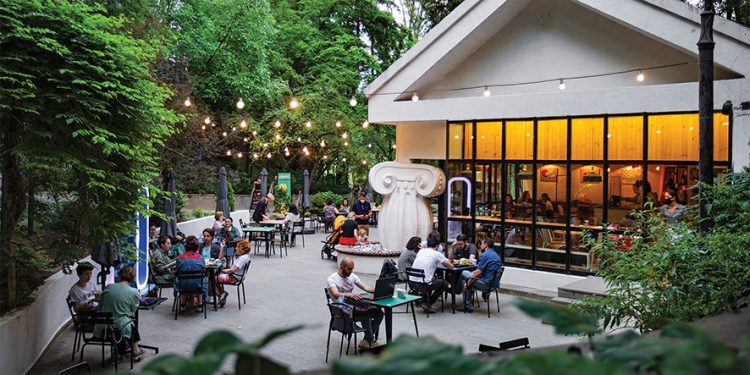From its inception, Café Mziuri was envisioned not just as a business venture, but as a catalyst for social change. Its founder’s Ana Goguadze’s vision was clear: To create a space where social entrepreneurship could thrive, benefiting both the local community and the park itself. The cafe’s commitment to sustainability is evident in its operational model, where profits are reinvested into the infrastructure and community-oriented projects. This approach has garnered widespread support from non-governmental organizations, corporate sponsors, and the community at large, all united in their admiration for Café Mziuri’s positive impact.
However, recent developments have cast a shadow over Café Mziuri’s future. Tbilisi City Hall’s decision to auction the building housing the cafe has sparked concern and dismay among its loyal patrons and supporters.

Cafe Mziuri’s Vision of Social Entrepreneurship
When Ana and her team took over in 2016, they faced a daunting task: Revitalizing a dilapidated building and unkempt park into a thriving community hub. Through tireless effort and community support, they succeeded in transforming the space into what it is today.
“Our concept was to establish a cafe whose profits would support the operational activities of Mziuri,” Ana explains. The initiative not only revitalized the physical space but also reinvigorated community spirit, drawing patrons from across Tbilisi who valued the cafe’s mission.
“It was a stagnant recreational zone where nothing was being done,” recalls Ana Goguadze, reflecting on the park’s state before their initiative took root. Determined to breathe life back into Mziuri Park, Ana and her team organized the Children’s Sun Festival, an event that she believes marked a turning point in raising public awareness about inclusion. “At that time, parents were hesitant to take their children out in wheelchairs,” she explains, highlighting the festival’s impact in fostering a more inclusive community spirit.
Despite initial success with the festival, Ana and her team faced the challenge of maintaining momentum in the park beyond these sporadic events. Their solution came in the form of Café Mziuri, housed in an abandoned building within the park. Proposing a self-sustaining model of social entrepreneurship, Ana approached the Mayor of Tbilisi with a vision to reinvest cafe profits into park maintenance and community projects. Supported by NGOs, companies, and local residents, they transformed the dilapidated space into a thriving hub of activity.

City Hall’s Decision to Auction
Recent developments have shaken the foundation of Café Mziuri’s existence. A letter dated June 13, 2024, from the property management agency to the cafe’s team delivered a harsh blow: The city administration, citing the need to mobilize funds, has decided not to renew the cafe’s contract. This decision has left its patrons and supporters dismayed, fearing the loss of a space that has become integral to the fabric of their lives.
According to City Hall’s press office, this decision follows the expiration of the cafe’s lease, which had previously been extended multiple times. City Hall says it aims to create a competitive environment where various parties, including the current operators of Café Mziuri, can participate to develop the space further as a social enterprise.
“The contract has expired, which has been extended multiple times in previous years,” the City Hall’s press office said. “This time, City Hall has decided to put it up for auction to create a competitive environment. Anyone with the opportunity to develop it as a social enterprise can participate.” They further assured that Café Mziuri would remain dedicated solely to social enterprise purposes, ensuring continuity in its mission of community enrichment and sustainability.

Concerns and Responses
Ana and her supporters, however, question the fairness and transparency of the decision-making process, as it is still unclear what type of auction it will be, what criteria will be used to judge it, who will oversee it, and who will make the final decision. There is also confusion stemming from the fact that Ana cannot recall anything like this ever happening to any social enterprise. Ana emphasizes, “This work requires knowledge, observation, experience, which should not be conducted as a competition.”
“Every two years, an independent audit highlighted our efforts, consistently showing that we were exceeding our obligations,” she says. For instance, where the contract stipulated 60 events over two years—encompassing children’s programs, youth engagement, presentations, and charity endeavors—they not only met but exceeded this target, organizing 91-110 events.
The future of this beloved social enterprise hangs in the balance. Supporters hope that the city will recognize the cafe’s broader impact beyond its commercial value and consider alternative solutions that allow it to continue its mission of inclusivity and community engagement. Supporters have rallied behind Ana’s efforts, signing petitions and urging the city administration to reconsider its decision. Ana herself has called for a meeting with Mayor Kakha Kaladze, seeking answers and advocating for the preservation of Mziuri as a social enterprise.

Community Impact and Sentiment
“Cafe Mziuri has turned into a small model of a country with European values, where everyone finds their place based on their interests,” Ana passionately affirms. With the community’s unwavering support, she remains hopeful that Café Mziuri will weather this storm and continue to serve as a beacon of hope in Mziuri Park for years to come.
Ana Zeragia, a regular guest, reflects on the cafe’s significance: “Thanks to Ana, such a place has been created that everyone finds something positive in.” Reflecting on the collective effort behind Mziuri’s existence, Zeragia acknowledges, “Concrete places are created by people.”
Indeed, the park is not just a result of Ana’s vision alone, but also a testament to the dedication of an entire team. “The great work put in here is not only the merit of Ana, but also of the whole team that we love,” Ana emphasizes. It is this collective passion that has made Mziuri not just a park, but a cherished community hub where diverse lives intersect. As Ana Zeragia explains, “To disappear, or even to change the team will radically change everything.” In her words lies a plea to safeguard the essence of Café Mziuri—a sanctuary that has woven itself into the fabric of Tbilisi’s cultural landscape and into the hearts of all who have been fortunate to visit it.
Hope and Uncertainty
As the fate of Café Mziuri hangs in the balance, the community remains hopeful yet determined. For many, Mziuri represents more than just a cafe; it symbolizes resilience, community spirit, and the power of collective action. Whether it continues to serve as a beacon of inclusivity and cultural exchange will depend on the outcome of ongoing discussions between its supporters and the city administration.
In the words of Ana Goguadze, “This space as it is today is not the result of my work alone. People joined me, believed in me, believed in the idea of a new Mziuri.” The fight to preserve Café Mziuri is not just about a physical space, it’s about preserving the values of community, inclusivity, and cultural vibrancy that have made it a beloved institution in Tbilisi. Supporters hope that public support will influence the outcome, ensuring that Café Mziuri continues to thrive as a symbol of inclusivity and community engagement in Tbilisi.
Café Mziuri’s journey from a neglected corner of Mziuri Park to a vibrant community hub exemplifies the power of social entrepreneurship. As it faces challenges from Tbilisi City Hall’s decision to auction its building, the cafe stands resilient with its supporters, determined to continue its mission of inclusivity and community enrichment. The coming months will undoubtedly be critical for Café Mziuri and its supporters, as they navigate through uncertainty and advocate for the preservation of this beloved institution.
By Kesaria Katcharava














